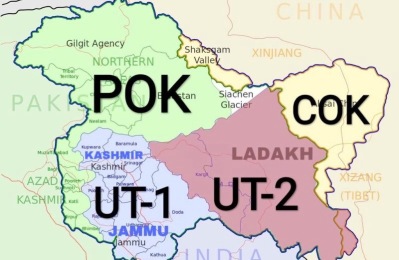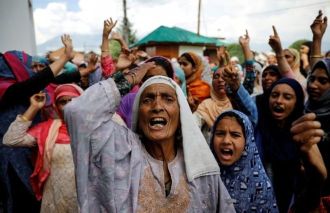Delusions about a “New Kashmir”
August 15, 2019 at 1:18 pm | Posted in Uncategorized | Leave a commentTags: colonialism, democracy, India, Kashmir, Pakistan, terrorism
Last Thursday, 8 August 2019, Indian Prime Minister Narendra Modi spoke to the nation justifying his government’s decision to end the ‘special status’ accorded to India’s only Muslim majority state, Jammu and Kashmir, and indeed to dismantle it as a state and make it into two Bantustans—Jammu & Kashmir with a legislature shorn of several important powers, especially with regard to law and order and land which will be controlled by the federal government; and Ladakh which would be ruled directly from New Delhi with no pretence of democratic accountability to its residents. In particular, the new regulations struck down a provision in the Indian Constitution—Article 35A—which restricted the purchase of land in Jammu & Kashmir to those whom its legislature classified as permanent residents. This provision, Prime Minister Modi said would lead to a new Kashmir, a naya Kashmir, which would become prosperous due to the possibilities open to investment: a reintegration with economic benefits

These measures were widely popular in much of the rest of India—with people bursting crackers, a routine practice of celebration, vowing to buy land there, even leading to the creation of a whole sub-genre of songs: and, with some in Haryana and other states, known for female foeticide and infanticide, fantasying bringing “white” Kashmiri brides!
In an unmistakeable parallel with the “white man’s burden,” Nirupama Rao, a former Foreign Secretary, wrote that in the Times of India that Kashmir was economically 200 years behind the rest of India—a claim that is patently untrue!

On a variety of socio-economic indicators, Kashmir fares better than the average for India: Jammu & Kashmir’s infant mortality rate (children under the age of one) per 1000 is 23; for India as a whole it is 33; Life expectancy at birth is 73.5 in Jammu and Kashmir, 68.7 is the India average; the poverty rate is 10.4 in J&K but 21.9 is the India average; the sex ratio at birth is 917 in J&K and only 896 in all of India, to take just a few indicators. Yet, Rao claimed:
Most importantly, the views of the Kashmiris were never sought. But let us examine the proposition whether the new measures would in fact bring about prosperity. The claim is based on the proposition that the removal on restrictions on the purchase of land would lead to a spurt in investment in tourism and even movie-maklng. Contrary to popular belief, this was a law introduced in Kashmir by its Hindu maharaja in the 1927 to quell fears among Hindus in Kashmir that outsiders—Punjabis, Europeans, others—would buy land in the idyllic valley. It was not directed against the Muslims who were too oppressed to be a threat to the Hindus at that time, though since 1947 Muslims have also come to see the value of this law. Similar laws exist in a number of border states of the country—Himachal Pradesh, Assam, Arunachal Pradesh. Nagaland, Manipur, and Tripura. It is this law, as Pallavi Aiyer argued in the Hindu newspaper, that shielded the people of Kashmir from “demographic engineering like the large-scale Han migration into Tibet and Xinjiang.” Indeed, after the decision to downgrade Jammu & Kashmir to a Union Territory, the local leader of the Bharatiya Janata Party (BJP) himself is on record saying that restrictions must be placed on outsiders buying land.
Restrictions on private individuals buying land in Kashmir, as a former state finance minister, Haseeb Drabu underlined in a television interview, did not prohibit corporations from taking land on extendable 90-year leases as the major hotel chains have done and the Birlas who set up a textile mill. Restrictions on land ownership also does not apply to the Indian government and its public sector undertakings which employ 1 million people in the country but only 21 in Kashmir. Border states depend heavily on the central government for investments, especially in infrastructure: and of that there has been precious little in Kashmir, Indeed, given the continued level of militancy, there is little reason to hope that these actions which have humiliated and outraged Kashmiris will lead to greater levels of investment.

And the state is seething with resentment: Kashmir has been under a communications lockdown for 10 days—no Internet connections (meaning also no credit or debit card transactions), no mobile phones or landlines, no cable TV and most newspapers closed—with a tight curfew. By some estimates, there is one military or paramilitary personnel per 10 persons in the Kashmir Valley! Political leaders in the state who had cooperated with the Indian government have been imprisoned and having been humiliated, they cannot now accept the terms imposed on them. The state police force, which had been on the frontlines of the war against militancy, have been disarmed. There is now no local interlocutor for the Indian government
As Mohamad Junaid wrote:
Without regard for its people,

It becomes in short, India’s West Bank: a place for settlers to move in armed convoys and occupy another people’s land (and Google searches for “land rates” and “plots of land” in Kashmir spiked soon after its special status was revoked). Kashmiris will be turned into Palestinians—“aliens, stone pelters, terrorist, who need to be disciplned.”The Modi-Shah plan to “integrate” Kashmir looks perilously close to Jared Kushner’s plan for investment with independence in the West Bank!
Blog at WordPress.com.
Entries and comments feeds.
